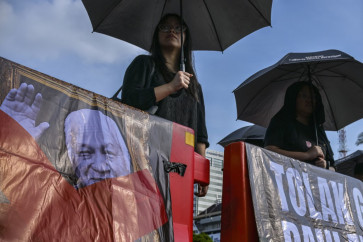Popular Reads
Top Results
Can't find what you're looking for?
View all search resultsPopular Reads
Top Results
Can't find what you're looking for?
View all search resultsKnow Your Caleg offers overseas voters insight
Overseas voters can now learn more about their legislative candidates through the Know Your Caleg (legislative candidate) platform, which provides information on candidates and their views on issues relevant to the Indonesian diaspora
Change text size
Gift Premium Articles
to Anyone
O
verseas voters can now learn more about their legislative candidates through the Know Your Caleg (legislative candidate) platform, which provides information on candidates and their views on issues relevant to the Indonesian diaspora.
The platform, launched following low overseas voter turnout rates in past elections, was developed by the Foreign Policy Community of Indonesia (FPCI), a civil society organization that focuses on Indonesian foreign policy, to educate voters on legislative candidates through the calegdiaspora.org website, which went online on March 1.
Using the website, voters can learn about the track records, campaign promises and programs of their candidates.
The website has thus far featured 34 candidates out of the total 105 candidates competing for seven House of Representatives seats in the Jakarta 2 electoral district, which covers Central and South Jakarta.
“This perhaps will make it easier for the diaspora so they know which out of the 105 candidates are actually serious about presenting their profiles and having views on diaspora issues,” FPCI founder Dino Patti Djalal said.
The website features not only profiles of the candidates, but also their contact information, including email addresses, personal websites and WhatsApp numbers, as well as social media accounts.
It also allows people to access videos of candidates answering questions about diaspora issues, including dual citizenship and the protection of migrant workers.
Rizky Putri Amalia from the National Awakening Party (PKB), for example, said in her video for the site that, if elected, she would take the issue of dual citizenship more seriously. She also pledged to advocate for migrant worker protection, particularly the protection of female workers who mostly work in the domestic sector.
PPI Canberra chairman Welhelmus Poek said he found the website useful as it provided unbiased information about the candidates amid fierce competition.
“The website is informative and — most importantly — neutral as it provides information about all candidates,” Welhelmus said. “There, we can find the candidates’ profiles, complete with an open letter and campaign video to voters.”
The website was useful to Indonesian students studying abroad in particular because they, like other overseas voters, did not have direct access to information about candidates, he said.
“By sharing it, we, the PPI, can still provide all information to Indonesian students in Canberra without being perceived of favoring certain candidates,” he said.
Overseas voter turnout rates have been very low in past elections, with the voter turnout in the 2014 legislative election recorded at 22 percent.
Concerns remain that the coming elections might also see a low level of overseas voter participation.
A survey released by Indonesian Diaspora Network-United (IDN-United) last month found that 85 percent of Indonesians living abroad either “did not know” or “did not know enough” about the candidates competing in the April legislative elections.
Many members of the Indonesian diaspora have long called for the formation of an overseas electoral district for better representation, particularly on issues that in-country voters consider less important, such as legal protection abroad, consular assistance and migrant worker protection.
The Jakarta 2 electoral district comprises 800,000 registered voters in Central Jakarta and 1.6 million registered voters in South Jakarta. However, it is the overseas vote that might be the determining factor in who wins the district, as more than 2.05 million registered Jakarta 2 voters live abroad.
“The overseas voters are just different from the Central and South Jakarta [voters]. To win over voters from the two areas, candidates can compete using campaign banners and billboards, but such measures are not applicable in terms of the diaspora. Instead, they have to show their ideals, credibility and commitment,” Dino said.










